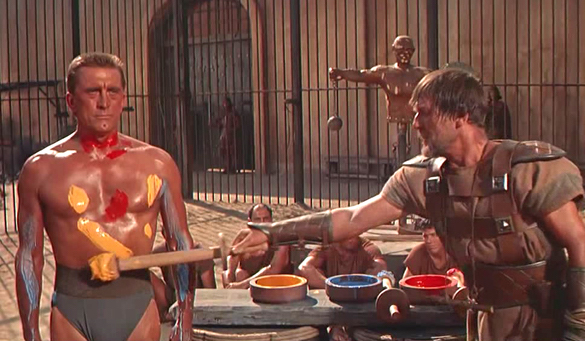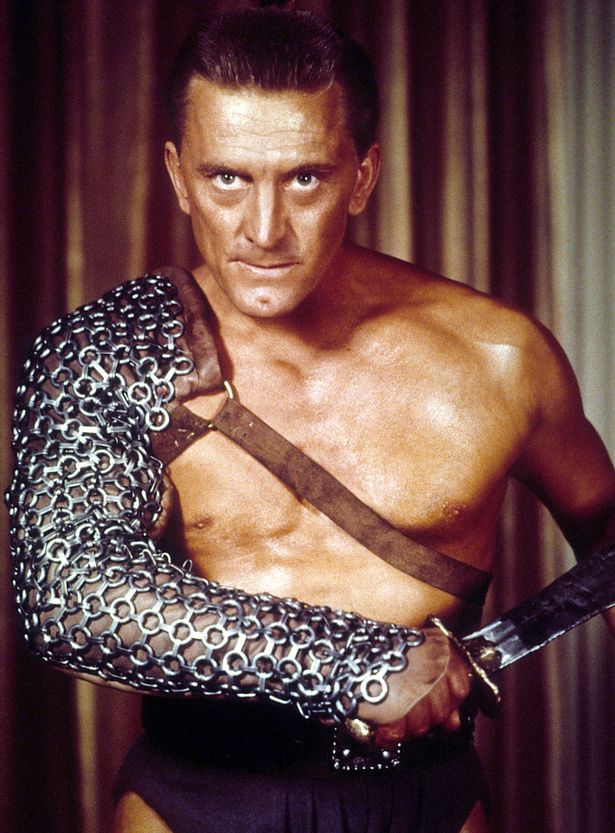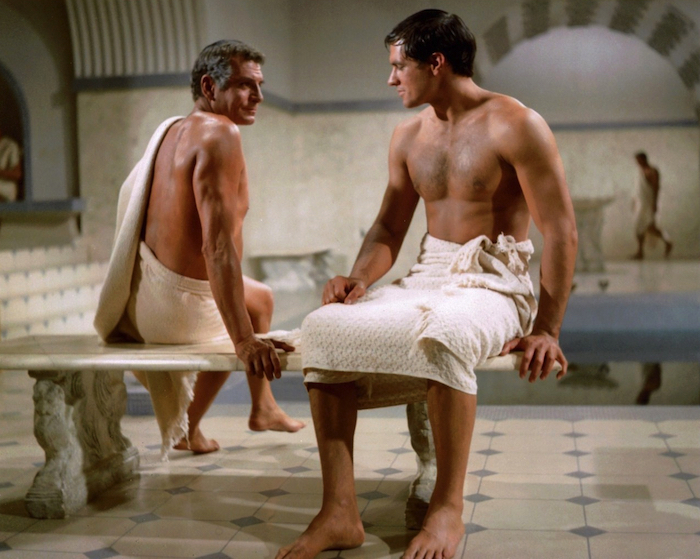Kirk Douglas Centennial: Spartacus (1960)
 Thursday, December 8, 2016 at 7:00PM
Thursday, December 8, 2016 at 7:00PM Here's Eric to continue our mini Kirk Douglas fest. The actor turns 100 tomorrow

The story goes that Kirk Douglas was so disappointed that William Wyler didn’t cast him as the lead in 1959’s Ben-Hur that he optioned Howard Fast’s similarly-themed novel Spartacus for his chance to conquer the Roman Empire...
The list of people involved with this film includes one legend after the next: in addition to Douglas, the film was directed by Stanley Kubrick, written by Dalton Trumbo, and co-stars Laurence Olivier, Jean Simmons, Charles Laughton, Tony Curtis, and Peter Ustinov (who won the Oscar for Best Supporting Actor). Even the title credit design comes courtesy of Saul Bass.
One could see why Douglas shepherded this project for himself (he has an Executive Producer credit on the film). It’s the kind of heroic role that stars pursued back in those days: a put-upon slave who spends the entire movie (repeatedly) rallying other misfortunates to rise against the power system and fight. Douglas’ cleft chin has never been better lit or added more distinguished character to his face. In fact, sometimes that chin is more interesting to watch than the character Spartacus himself...

Spartacus has little complexity being purely good, valiant, and noble. We’re hurled back to a time when this is how stars wanted to see themselves, and probably how people wanted to see stars. There’s not much acting that’s required of Douglas in this movie, just a lot of executing plot mechanics with authority (which, admittedly, he has in spades).
Spartacus lacks the good cheesy fun of Ben-Hur and The Ten Commandments. But it all comes together in the final hour, when Olivier kicks into gear preserving the Great Roman Ideals. He’s both straightforward and a little hammy, and the picture needs more of that. The rest of the cast delivers with mixed results: Jean Simmons gives a breathy, silly, boring, and occasionally kinky performance as the heroine, and Tony Curtis looks confused throughout: he flees Olivier’s advances for buttsex and then starts performing magic acts for the other slaves. On the bright side, a preposterously hot John Gavin has an extended shirtless scene in a sauna that’s a visual highlight of the film though he's otherwise sadly underused. And in retrospect, if Ustinov’s Oscar seems a bit much, he does create a recognizably crafty human being, and finds some light comedy to play here and there.
 Sir Laurence and John Gavin in Spartacus (1960)
Sir Laurence and John Gavin in Spartacus (1960)
Spartacus was a big box office success and remains one of Kirk Douglas's most beloved films. There’s no doubt it’s big and it delivers in scope. But today, the fight choreography looks and feels like just that, the sets come across disappointingly fake (without even self-aware Hollywood sheen), and the secondary leads score the biggest points. For all of that Spartacus remains certainly a crystalline example of Douglas's star power in a hard-fought hero role in a genre (sword-and-sandal epic) that was soon to disappear.

More: Lust for Life, The Bad and the Beautiful, and 20,000 Leagues Under the Sea



Reader Comments (14)
If anyone who shld've been nom n won for Spartacus, shldnt it b Olivier? He was deliciouly campy n hammy, imo betta than his insufferable perf for The Entertainer, oso nom in the same yr.
This, like most of these Biblical pageants, is overlong but I find it infinitely more enjoyable than the slog that is Ben-Hur with Mr. Lockjaw himself-Chuckles Heston. The only part of that mess that is interesting outside the chariot race is Stephen Boyd. I will admit it isn't the same sort of cheesy fun that The Ten Commandments is but that is in a class by itself in that regard.
I thought all the performances were fine except that mechnical John Gavin no matter how good he looks with his shirt off, these aren't really the type of films that provide nuanced acting opportunities and Olivier & Ustinov understood that going the florid route. What something of this scope does require though is someone at its center that has the kind of big star charisma Douglas possessed to hold it together, you can't take your eyes off him whenever he's in the scene.
For me, this film simply cannot escape the looming shadow of the extraordinary Ben-Hur. Still, it's a grand Hollywood entertainment. I'm always mystified this was directed by Kubrick. It just doesn't bear his signature.
brookesboy: Kubrick was barely what we think of him as before 62, though. He still had a bit of cynicism, but the pure clinical worldview/aesthetic of 2001-The Shining was a few films away. As far as this? For me, it's at the very least the least flawed of this type of movie. Ben-Hur 1959 has higher peaks (especially the chariot scene), but it also has lower valleys.
joel6: I don't think I'm that against Ben-Hur. I don't like it as much as this, but I didn't hate it. Heston, as a performer, was never better than there. To compare him to Ahnold, it's his Total Recall with Touch of Evil as his T2.
I don't feel like sitting through a mediocre 9-hour spectacle, so, just tell me: why is he being painted?
1960 top-grossing films in US
01 Spartacus
02 Psycho
03 Exodus
04 Swiss Family Robinson
05 The Alamo
06 The Apartment
07 Butterfield 8
08 Ocean's Eleven
09 Please Don't Eat The Daisies
10 From The Terrace
A terrible age for movies, right? I'm glad I am young now so I can see real nice movies like Suicide Squad and San Andreas. Psycho (?), The Apartment (?), really? What were they thinking?
I guess that people at that time had nothing to do but go to the movies. No internet and a very bad TV.
Anyway, it's great to see someone living for so long. Congrats!
Well Frederic, to be fair, only 3 of those top ten from 1960 are actually great movies.
JJ: The red paint is kill zones, the yellow is wound zones, the blue paint is don't hit.
Arlo: 3 of 10 being great is still better than most years, is what I think he's saying. Consider that, usually, no A or higher movies wind up being in the top 10 and more than ONE A or higher movie winding up there is kind of a miracle. (Within my lifetime, only twice. Once in 1991, again in 1999.)
Volvagia: that's amazing (and kind of hot?). Thanks!
I think what's most frustrating about this post is that if Wyler had cast Douglas in Ben-Hur, Douglas would have received the competitive Oscar he should have picked up at some point during his career, and crazy ol' Heston would not have that on his resume.
I loved the urban myth story about the guy who used "Spartacus" as his Starbucks name. When the barista called out his order "Spartacus?", everyone in the coffee shop stood up: "I am Spartacus", "No, I am Spartacus".
I've only seen parts of the movie, but it's theme of fighting against oppression seems to stay current. And the need for a mass movement against tyranny is something that generation understood, and had participated in.
I love Kirk Douglas's boundless energy and his commitment to making a meaningful statement and making it entertaining so you wouldn't forget it.
I also loved Charlton Heston in Ben-Hur, although that piece is more about personal injustice. One of my favorite Heston performances is as the Player King in Kenneth Branagh's "Hamlet", where you recognize the depth and variety of Heston's skill.
When Shirley Knight was asked about her rollercoaster career, she said, "Hollywood is a place where they give Charlton Heston an acting award." Love Shirley, but I think Heston's performance in Ben-Hur unfairly gets a bad rap. He's really terrific, and far surpasses anything else he ever did. Wyler knew how to extract great performances, even from those who weren't always the best at what they did. There's a stylization to his performance that honestly works in this iconic role. I stand for his Oscar, even though most believe Lemmon was robbed. I do not.
It's a great film and yes Gavin was a very special visual effect
Nice information available in this website!!
Spartacus was nominated for six Oscars in 1960, winning for Supporting Actor, Art Direction, Cinematography and Sound.
Despite is tremendous popularity and obvious artistic integrity, AMPAS did not nominate the film for Best Picture, Director, Actor, and Screenplay. The reason for the snub was that producer Edward Lewis, director Stanley Kubrick, and star Kirk Douglas agreed to defy the industry and credit blacklisted writer Dalton Trumbo for the screenplay.
Right wing groups organized protests outside movie theaters screening the popular film, but their efforts were to little avail. The public wanted to see Spartacus. The death of the black list symbolically occurred when then President John F. Kennedy was photographed crossing the picket line to enter the cinema to see the film. Kennedy's action did not prick the conscience of the typically conservative membership of the Academy who failed to recognize the film in the major categories.